We have a chessboard with the two opposing corners removed,so that
there are only 62 squares remaining.Now we take 31 dominoes shaped such that
each domino covers exactly two squares. The question is:is it possible to
arrange the 31 dominoes so that they cover all 62 squares on the
chessboard?

There are two approaches to the problem:
(1) The scientific approach
The scientist would try to solve the problem by experimenting,and after trying
out a few dozen arrangements would discover that they all fail.Eventually
the scientist believes that there is enough evidence to say that the board
cannot be covered.However,the scientist can never be sure that this is truly
the case because there might be some arrangement which has not been tried
which might do the trick.There are millions of different arrangements and
it is only possible to explore a small fraction of them.The conclusion that
the task is impossible is a theory based on experiment,but the scientist
will have to live with the prospect that one day the theory may be overturned.
(2) The mathematical approach
The mathematician tries to answer the question by developing
a logical argument which will derive a
conclusion which is undoubtedly correct and which will remain unchallenged
forever.One such argument is the following:
* The corners which were removed from the chessboard were both white.Therefore
there are now 32 black squares and only 30 white squares.
* Each domino covers two neighbouring squares,and neighbouring squares are
always different in colour,ie one black and one white.
* Therefore,no matter how they are arranged,the first 30 dominoes laid on
the board,must cover 30 white squares and 30 black squares.
*Consequently,this will always leave you with one domino and two black squares
remaining.
*But remember all dominoes cover two neighbouring squares,and neighbouring
squares are opposite in colour.However,the two squares remaining are the
same colour and so they cannot both be covered by the one remaining
domino.Therefore,covering the board is impossible!
| WAV 357K | WAV 78K | WAV 169K |
"Fermat's Last Theorem" by Simon Singh (p24)
Exile to Hell Isaac Asimov
He considered the chessboard carefully and his hand hesitated briefly
over the bishop.
Parkinson,at the other side of the chessboard,watched the pattern of
the pieces absently.Chess was,of course the professional game of computer
programmers,but under the circumstances,he lacked enthusiasm. By
rights,he felt with some annoyance,Dowling should have been even worse off;
he was programming the prosecution's case.
Climatic
Chess
The game of chess involves a number of pieces and a board ruled into squares.
Moves in the game take place at discrete time intervals, according to the
laws of the game. Numerical weather-prediction is like a huge game of three
- dimensional chess. Imagine a fine grid of points drawn on the surface of
the Earth, at several heights to track the up - down motion of the atmosphere
as well as north-south and east west. This is the chessboard. The weather
now is described by assigning, to each grid point, several numerical values:
pressure, temperature, humidity, wind-speed. These are the chess-pieces.
The weather tomorrow also corresponds to a position in the game but the
disposition of the pieces is different. "Cyclone to Queen's Knight743." "
Blizzard to King's Lynn, Showers with Sunny Intervals to Bishop's Stortford."
We can measure today's weather using meteorological stations, ships, weather-
balloons, and satellite pictures. So we know how to set up the pieces. The
main question is, what are the rules of the game? The rules are the equations
of motion of the atmosphere. As we saw, these were found centuries ago by
the likes of Leonhard Euler and Daniel Bernoulli. By letting time flow in
tiny discrete steps, say one second long, the equations can be viewed as
rules telling us how to get from the position now to the position in one
second's time. Predicting the weather one second ahead may not sound a practical
contribution to the weighty problems of human kind, but that's just one move
in the game. Repeat the calculation, and you have the weather two seconds
into the future. After 86,400 iterations, you'll know the weather a day from
now. After 8,640,000 you'll know the weather a hundred days from now. After
8,640,000,000 . . . And in essence that's how it's done. Thousands upon thousands
of repetitive calculations based on explicit and deterministic rules.Just
what the computer is good at.
Twixt Zero and Infinity
There's a philosophical curiosity involved in all this. The atmosphere isn't
really a perfectly divisible continuum; it's a lot of fairly solid little
atoms charging around like lunatics crashing into each other. The equations
of smooth ideal classical mechanics replace this discrete physical reality
by a fluid. But in order to solve those equations we approximate them by
something discrete again. We let time click ahead in tiny steps,continuously,
and we divide space up into a fine grid. This is forced by the structure
of computers: they can only do arithmetic to some definite number of decimal
places, say ten, in which case everything is an integer multiple of 0.0000000001.
To represent an infinite decimal exactly requires an infinite amount of computer
memory, which isn't feasible. The philosophical point is that the discrete
computer model we end up with is not the same as the discrete model given
by atomic physics. But there's a very practical reason for this: the number
of variables involved in the atomic model is far too large for a computer
to handle. It can't track each individual atom of the atmosphere.
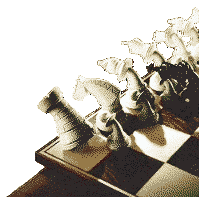 Computers
can work with a small number of particles. Continuum mechanics can work
with infinitely many. Zero or infinity. Mother Nature slips neatly into
the gap between the two. So we do the best we can. Mathematicians hope that
this double approximation provides answers that are close to the real thing.
There are no substantial theoretical proofs that this is so; but there's
compelling evidence that it works. Until some genius develops new theoretical
tools, we accept the miracle and plough ahead regardless. It is, however,
worth remembering that when you "put the problem on the computer" you do
nothing of the kind: you represent some idealization of the problem in the
computer. This is one reason why the computer cannot be a universal palliative
for the ills of science and society. It just isn't clever enough yet.
Computers
can work with a small number of particles. Continuum mechanics can work
with infinitely many. Zero or infinity. Mother Nature slips neatly into
the gap between the two. So we do the best we can. Mathematicians hope that
this double approximation provides answers that are close to the real thing.
There are no substantial theoretical proofs that this is so; but there's
compelling evidence that it works. Until some genius develops new theoretical
tools, we accept the miracle and plough ahead regardless. It is, however,
worth remembering that when you "put the problem on the computer" you do
nothing of the kind: you represent some idealization of the problem in the
computer. This is one reason why the computer cannot be a universal palliative
for the ills of science and society. It just isn't clever enough yet.
"Does God Play Dice?" Ian
Stewart (p116)
Falsifiability
In science,there's a time honoured way to find out whether a theory is right.
Experiment.
More accurately,an experiment can tell you whether a theory is
wrong,for you can never be absolutely certain that it's right.You
can prove a theorem in mathematics,but you can't prove a theory. As
the philosopher Karl Popper
emphasized,testing a scientific theory is a matter
of falsification,not
verification.
The more a theory fails to be falsified when confronted by experiment,the
more likely it is to be true;or at least the broader the range of conditions
under which it works.But you can never be certain the theory is absolutely
correct,even if it survives a million experimental tests;for -who knows?
-it may fail at the million and first.
To count as scientific,a theory must in principle
be falsifiable.On the island of Corfu,there's a superstition that if
you see a praying mantis,it either brings you good luck - or bad
luck,depending on what happens.This belief doesn't amount to a scientific
theory;not because you can't measure "luck",but because it's hard to see
how an experiment could disprove the theory even if you could.
None of this means that the inhabitants of Corfu are wrong. What we're discussing
is the limits on scientific knowledge. There may be true things in the universe
that cannot be known in the scientific sense.However,it's going to be hard
to resolve disputes about them.
"Does God Play Dice?" Ian Stewart (p164)
[Upon this basis,belief in God or any other superstition is rather like
belief in the capacity of a praying mantis to provide good or bad luck.The
idea is somewhat tautological,the luck will happen anyway,regardless of a
praying mantis being behind it,and so the mantis is nothing to do with the
cause and effect.
Evolution has been around for ages and has withstood every stone thrown
at it,thus increasing the likelihood that it is right.Every attempt at falsifying
it has failed.Evolution wasn't assumed to be true in the first instance,it
has grown to be more likely to be true over time.Belief in God or any other
mysticism assumes the truth of the statement in the first instance,and claims
it as the truth until such time as counter-evidence is found.This inverts
the scientific scenario of how a theory builds it's reputation.Mystics
assume the reputation of their belief first and then have to have it
denied.
Bizarrely the likes of Russell Stannard
attempt to perform experiments on beliefs in God to try to assert their
validity,at least he is trying to use the scientific method the right way
around.Mystics assume cause and effect with no proof, rather as the inhabitants
of Corfu do with mantis,and even if counter evidence or lack of evidence
undermines that position,they hold onto it anyway,regardless of whether
it is valid.As Ian Stewart suggests in his book,there could very well be
an invisible monster creating the observed chaos in the universe,but we have
no evidence for such a creature,and any theory of invisible monsters would
have to hold it's own over time and prove itself as one attempted to falsify
it,assuming that it was,in principle falsifiable.
By comparison,mystics would assume that an invisible monster was there,and
performed actions in the world,with no evidence to show that a monster
was indeed the cause,and when the monster theory was falsified,would still
adhere to that theory even though it was wrong,or as with the people of Corfu
at least be in the position of not being able to be proved correct,and are
thus just as likely to be incorrect.Likewise with God and other beliefs,one
cannot show either conclusive evidence for or against,and thus there is no
reason to believe with great conviction something which has so little
credence.
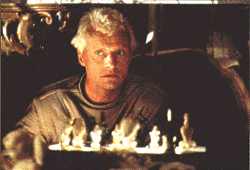
Even if one had a "theory of God",such a theory would have to stand the same
sort of scrutiny that a scientific theory does.As with Russell Stannard one
is forced into a farcical scenario of second guessing God and what things
an omnipotent deity will or won't do or be capable of,or assuming that such
a being will be at your beckoning.Whichever way you look at it, unsubstantiated
belief is a farce,you just can't win. You can't prove anything, and you can't
prove anything wrong. Thus there is just no point in doing it. Notwithstanding
the plethora of evidence in Nature of adaptation and change which shows
that evolution is going on,denying that it is makes no sense,if one is doing
it purely on the basis of a convicted belief.As Ian says,such things
as evolution are "theories" and as such cannot be 100% true,so any such theory
cannot represent a direct assault on a convicted belief by being "proved
correct".
The view that seeks to keep evolution out of the classroom is thus
misinformed about the nature of a scientific theory.It is not a threat
to a convicted belief. Any sane person though,would actually think that any
premise would need evidence to support it and have cause and effect shown.This
is not done in the case of superstitious belief.
For the above reason,belief in God cannot be proved true or false,whereas
a theory such as evolution can show itself to have pertinence as time goes
on,so if they are to be taught alongside each other,if anything evolution
has a greater claim to be taught,since at least it has evidence to support
it,whereas belief in "invisible monsters" does not,and can't have any positive
evidence that it is true. -LB]
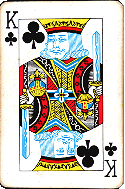 Did you ever here the
story of the King that required the help
of a mathematician? Having performed a service for the King,the mathematician
was asked how he could be rewarded.He asked that the King place a grain of
rice on the first square of a chess board,and double the number of grains
thereafter on each subsequent square.The King thinking this was a trivial
reward asked whether this was all the mathematician wished of him.This was
all the mathematician wished and so the King went ahead,placing grain after
grain on the board,each square having double the number of grains in the
previous one.
Did you ever here the
story of the King that required the help
of a mathematician? Having performed a service for the King,the mathematician
was asked how he could be rewarded.He asked that the King place a grain of
rice on the first square of a chess board,and double the number of grains
thereafter on each subsequent square.The King thinking this was a trivial
reward asked whether this was all the mathematician wished of him.This was
all the mathematician wished and so the King went ahead,placing grain after
grain on the board,each square having double the number of grains in the
previous one.
|
| Starting at square one,and doubling,numbers grow exponentially fast.On reaching the 28th square there would be 2.7x108 elements.On the 64th square there would be 1.8x1019 elements. |
It soon became apparent to the King that he had been asked for
a larger reward than he had first supposed, for the number of grains quickly
mounted,until the board could no longer contain them.
Have you ever heard of Moore's Law? The premise
that the number of transistors on a computer chip will
double in 18 months? The number of transistors
on current processors would require a number that inhabits the 28th
square of the chess board,using the King's grains to measure it,after this
point there becomes a physical limit on the
number and size of the transistors. In order to continue the size of
the transistor becomes comparable with wavelengths of
light,and the signal is no longer capable of sticking in the transistor
that holds it. It's possible that because of this such circuits will exhibit
"quantum interference effects" which may or may
not be beneficial depending on how they are exploited.
The King's move is one square at a time.Perhaps if he had conceived of the
board all at once,he would not have found himself at a disadvantage with
numbers.It seems that a quantum computer will have the advantage of the
King.
| A SHORTCUT THROUGH TIME: THE PATH TO THE QUANTUM COMPUTER
by George Johnson In the 1960s Gordon Moore made the empirical observation that the density of components on a chip was doubling roughly every 18 months. Over the past 40 years, Moore's law has continued to hold. These doublings in chip density explain why today's personal computers are as powerful as those that only governments and large corporations possessed just a couple decades ago. But in 10 to 20 years each transistor will have shrunk to atomic size, and Moore's law, which is based on current silicon technology, is expected to end. This prospect drives the search for entirely new technologies, and one major candidate is a quantum computer--that is, a computer based on the principles of quantum mechanics. There is another motive for studying quantum computers. The functioning of such a device, which lies at the intersection of quantum mechanics, computer science and mathematics, has aroused great intellectual curiosity. Buy it Now! What is Moore's Law? [Video] Ever wonder why Apple puts out a newer, tinier iPod every two freaking seconds? Or why you're watching this on a laptop instead of a blinking, blooping Star-Trek-style wallputer? Moore's Law is the reason. Christie Nicholson explains how it works -- in pretty much the lowest-tech way possible. |
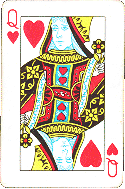 This is where the gods play games with
the lives of men, on a board which is at one and the same time a simple playing
area and the whole world. And Fate always wins. Fate always wins. Most of
the gods throw dice but Fate plays chess, and you don't find out until too
late that he's been using two queens all along. Fate wins. At least, so it
is claimed. Whatever happens, they say afterwards, it must have been
Fate.* Gods can take any form, but the one aspect
of themselves they cannot change is their eyes, which show their nature.
The eyes of Fate are hardly eyes at all - just dark holes into an infinity
speckled with what may be stars or, there again, may be other things. He
blinked them, smiled at his fellow players in the smug way winners do just
before they become winners, and said: "I accuse the High Priest of the Green
Robe in the library with the double-handed axe." And he won. He beamed at
them.
This is where the gods play games with
the lives of men, on a board which is at one and the same time a simple playing
area and the whole world. And Fate always wins. Fate always wins. Most of
the gods throw dice but Fate plays chess, and you don't find out until too
late that he's been using two queens all along. Fate wins. At least, so it
is claimed. Whatever happens, they say afterwards, it must have been
Fate.* Gods can take any form, but the one aspect
of themselves they cannot change is their eyes, which show their nature.
The eyes of Fate are hardly eyes at all - just dark holes into an infinity
speckled with what may be stars or, there again, may be other things. He
blinked them, smiled at his fellow players in the smug way winners do just
before they become winners, and said: "I accuse the High Priest of the Green
Robe in the library with the double-handed axe." And he won. He beamed at
them.
*People are always a little
confused about this, as they are in the case of
miracles. When someone is saved from certain death
by a strange concatenation of circumstances, they say that's a
miracle. But of course if someone is killed by
a freak chain
of events - the oil spilled just there, the safety fence broken just
there - that must also be a miracle. Just because it's not nice doesn't mean
it's not miraculous . - Terry Pratchett "Interesting Times"
A computer is contesting a national chess championship for the first time,reports David Harrison in Rotterdam
|
| Every move you make:grand master Frisco Nijboer plays Fritz,the computer."The essence of competition at this level is man versus man," say sceptics |
Frisco Nijboer the Dutch grand master, slid the white king's
pawn forward, took a sip of water and looked up at his opponent. It was a
conditioned reflex. Nijboer was playing Fritz the computer and Fritz, competing
in the Dutch national championships, was not about to give anything away
through body language.
 |
| Frans Morsch,the program's creator |
The creator of Fritz's program, Frans Morsch, a Dutchman, input the coordinates
of Nijboer's move on a keyboard. Within seconds the computer delivered its
response. Nijboer had barely time to put his glass down. A black pawn moved
forward to block his white adversary.
The move was relayed simultaneously on Fritz's screen and a television monitor
watched by the audience. Morsch then duplicated Fritz's move on the chessboard
in front of Nijboer and sat back to wait.
Fritz is the first computer ever allowed to compete in a national championship
and the move has appalled traditionalists and many of the world's leading
players, including Britain's Nigel Short, a former world championship
finalist.
They argue that national tournaments are about man versus man, not man versus
machine. And they are horrified by the prospect of a computer being the chess
champion of the Netherlands, one of the stronger chess-playing nations -
by Friday night Fritz was joint second with six games to play.
The games are being played on six tables on the stage of Rotterdam's Library
Theatre. Five tables have two human competitors each. The one on the left
has Nijboer and the computer.
An audience of about 40 looks on, copying the players' monastic silence and
following every move on six screens. The auditorium is dimly lit but spotlights
beam on to the tables.
Fritz's presence has altered the mood of the tournament. Another grand master,
Paul van der Sterren, has boycotted it, while Manuel Bosboom resigned in
protest after four moves of his game against Fritz. Computers don't belong
here," he said. They are ugly and absurd."
Others are playing on and, despite the complaints, are curious about their
electronic rival. When they rise for a break most drift towards Fritz's table
to check proceedings. The computer was named by its German marketing company.
The blurb refers to Fritz having been "born in Hamburg in November 1991"
and lists its parents as Morsch, Matthias Feist and Matthias
Wüllenweber.
The computer terminal is only the top half of Fritz. The rest is hidden below
the stage. The package includes four powerful processors containing a huge
database on all the participants in the championships, along with a large
store of game openings and endgame strategies.
The speed of its responses can be demoralising. The talented Jeroen Piket,
31, who has twice beaten Garry Kasparov and drew
with Fritz last week, said: "I'd spend 15 minutes deciding on a move, then
he'd reply in a few seconds. It's a bit shocking."
The players accept that computers have an important role to play in helping
people learn the game and prepare for matches. But they say machines have
unfair advantages in top-level tournaments.
Fritz has a record of all the moves played by his opponents in their previous
matches, enabling him to work out how they are likely to respond to his moves.
The human players can study opponents' past strategies before a game but
not during it.
There are other crucial factors. Fritz never tires, his mood is never affected
by a bad night's sleep or a row with his wife and he is impervious to
psychological warfare.
The Dutch Chess federation is backing Fritz. A spokesman said the computer
had generated interest in chess and increased the prize money by £19,500,
to £43,750.
Morsch said it was "absolutely right" to pit him against humans. Five years
ago they couldn't do it and in another five years they will be too fast for
humans. Now is the time when it makes for interesting matches."
But Nigel Short, a world championship finalist against Garry Kasparov in
1993, said: "The Dutch Chess Federation must have gone completely nuts. You
wouldn't let power boat compete in a swimming event or a forklift truck in
a weight lifting competition."
Fritz's enemies have at least one consolation: if he wins will not be allowed
to take home the prize money.
The Sunday Telegraph 14 May 2000
Shobna's chess challenge |
|
| Street star joins the Kirsty fundraiser CORONATION Street star Shobna Gulati checked in to help the £5m appeal for the future of Didsbury's children's hospice. Shobna, who is shop girl Sunita Parekh in the Granada television soap, sat down with chess grandmaster Jonathan Rowson as he tried to break the British record for games played simultaneously. Jonathan played 150 games in nine hours, winning 137, drawing 12 and losing one. The record stood at 142, set in December 1956. The record holder Jeff Martin flew in from America to witness the attempt to steal his crown. Players taking part in the event, organised by Mind Sports Olympiad, a nine day festival of thinking games and mental skills, included total novices to grand-masters from Greater Manchester . All money raised from the games, played on 150 tables at the Sugden Sports Centre, Grosvenor Street, Manchester will be donated to help safeguard the future of the Francis House Children's Hospice in Didsbury. Kirsty Howard, who fronts the appeal that has reached £2.25m, has been feted by celebrities for the way she has ignored her own health problems to work for the appeal. |
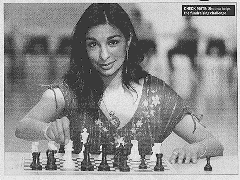 |
| Kirsty, who was born with her heart back to front,
stomach problems and some organs, including her liver, in the wrong place,
was not able to attend.Susie Mathis, co-ordinator of the hospice campaign,
said: "It never ceases to amaze me the different areas of support the appeal
receives, and each one is as important as the next. "It really doesn't matter
whether it is a chess championship, sponsored head-shave, military two-step
or cheerleaders doing the bit to raise money, every penny counts and is much
appreciated." Susie, who is helping to prepare a glitzy, star-studded
fund-raising ball in time for Kirsty's eighth birthday on September20, added:
"Healthwise, Kirsty is about the same, but her spirit just gets brighter
and brighter. She is an amazing little girl, and as we approach half-way in the £5m appeal to secure the future of Francis House, I hope we can get through the second half of the fund-raising even quicker" David Levy, event founder of Mind Sports Olympiad, said: "We wanted to organise a special curtain-raiser for the Olympiad, to thank Manchester for supporting our event. It is hard to think of a more worthwhile cause." |
|
The clockwork grandmaster |
||||||
In the spring of 1770, an extraordinary mechanical man known
as "The Turk" made his debut at the imperial court in Vienna. He was fashioned
from wood, powered by clockwork and dressed in a stylish Turkish costume.
His inventor, a 35-year-old Hungarian civil servant by the name of Wolfgang
von Kempelen, boasted that The Turk could beat anyone at chess, an incredible
proposition in an era long before the advent of computers. Kempelen had no
plans for his chess-playing machine other than to amuse the court. He could
have no idea that his automaton would achieve fame throughout Europe and
America, that figures such as Napoleon Bonaparte and Edgar Allan Poe would
become fascinated by it, and that the mystery of how The Turk worked would
remain unsolved for almost 90 years.
When the Empress Maria Theresa indicated, at The Turk's inaugural
appearance, that Kempelen should begin, he wheeled his automaton forward.
The life-size figure sat behind a wooden cabinet or counter three feet high,
four feet wide and two-and-a-half feet deep, with a board screwed to its
top. The whole contraption ran on four brass castors that not only let it
move freely, but also raised it slightly off the floor so that the audience
could see that there was nothing untoward going on beneath.
The basis of Willis's argument was the notion that no mechanism,
however complex, could play chess: such a feat was, he declared, "the province
of intellect alone". Yet just as Willis's pamphlet appeared, another young
Englishman was coming to exactly the opposite conclusion: the computing pioneer
Charles
Babbage.
|
Further Reading
Does God Play Dice?
Ian Stewart |
| Chaos | Quantum | Logic | Cosmos | Conscious | Belief | Elect. | Art | Chem. | Maths |
File Info: Created --/--/-- Updated 2/12/2007 Page Address: http://members.fortunecity.com/templarser/chess.html